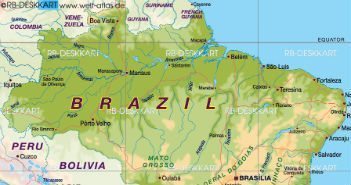Argentina is set to conduct spectrum auctions this year designed to free up frequencies for both 3G and 4G services.
According to the minister of economy, Axel Kicillof, and the communications secretary, Norberto Berner, the 1.7/2.1 GHz (advanced wireless services) band auction will focus on LTE services while the 1.9 GHz and 850 MHz spectrum auction will target 3G services. In 2011, Argentina adopted the Asia-Pacific Telecommunity standard for the 700 MHz band. The winners of the LTE spectrum auction will have to provide coverage for 98% of the population.
Argentina’s LTE auction has been expected since 2012, when the federal government said it planned to auction the AWS spectrum bands to allow carriers to deploy LTE-based services. As for 3G, the Argentinian government in 2012 canceled plans to auction wireless spectrum and instead allocated 25% of the 3G spectrum to the state-run satellite firm Arsat.
Telefónica’s LatAm results — The Spanish group Telefónica reported revenues totaling $4.72 billion in the first quarter of 2014 for its Hispanoamérica unit, which covers all the company’s Latin American operations except for Brazil; the total is up 14.8% year-on-year in organic terms. Revenue for the carrier’s Brazilian operations amounted to $3.66 billion, up 0.2% year-on-year. The Brazilian results were negatively impacted by the reduction of mobile termination rates and lower revenue from handset sales (reducing growth by 2.7 and .8 percentage points, respectively). Accesses in Hispanoamérica grew 5% compared to March 2013, representing 41% of total accesses, while Telefónica Brasil accesses increased 3% year-on-year, representing 30% of total accesses.
In Brazil, Telefónica has invested $450 million during the first quarter of 2014 to improve network capabilities focused on 3G and 4G and expand fiber to the home.
Nextel losses — NII Holdings reported a net loss of 52,000 subscribers for the first quarter and revenue of $970 million, a 27% decrease compared to the first quarter of 2013. The company also generated a net loss of $376 million from continuing operations. During a conference call about the results, the company released its plans to launch LTE services in Rio de Janeiro this year but reinforced that the focus remains on providing 3G services across Latin America. In a statement, Steve Shindler, NII Holdings’ CEO, said the goal for 2014 is to drive better operational and financial results by stabilizing operations in Mexico and investing in subscriber growth in Brazil.
Uruguay numbers — Recent telecom numbers show that Uruguay ended December 2013 with nearly 5.3 million mobile users, led by Antel (49% of market share), followed by Movistar (35%) and Claro (16%). The total user base represents a 5.4% increase compared to 2012. As for Internet access, 69% of the population has some type of access to the global network. Mobile broadband had 1.55 million users in December.
More news from Latin America:
- Mexico’s Instituto Federal de Telecomunicaciones (Ifetel) has reportedly passed new measures designed to make the number portability process more transparent.
- Eyeing the FIFA World Cup, Vivo is offering roaming deals on 4G services for users from 13 countries. Tourists who want LTE access in Brazil must have phones that are compatible with Brazil’s 2.5 GHz LTE frequency.
- Qualcomm and the Brazilian government signed two memorandums of understanding under which the U.S.-based company will use Brazil as a platform to launch a new semiconductor technology for smartphones.
- Brazilian state-owned postal service Correios has obtained a license from Anatel to become a full mobile virtual network operator.
- CELISTICS, a logistics and planning solutions provider, signed a new outbound services agreement with Telefónica’s Brazilian unit Vivo for storage and transportation operations in the state of Minas Gerais.
- Vivo has also deployed TOA Technologies’ field service management solution.
- Virgin Mobile Latin America announced the closing of a new $86 million equity capital funding round supported by an expanded debt facility of $41.5 million, including its new Mexican operations. The proceeds will be used to launch the Virgin Mobile brand in Mexico in 2014 and Brazil in 2015, and fund further growth and expansion opportunities as they arise in the region, including existing operations in Chile and Colombia.
- Ericsson was chosen by Vivo in Brazil to support its digital city project in Águas de São Pedro.
Wondering what’s going on in Latin America? Why don’t you follow me on Twitter? Also check out all of RCR Wireless News’ Latin American content.

